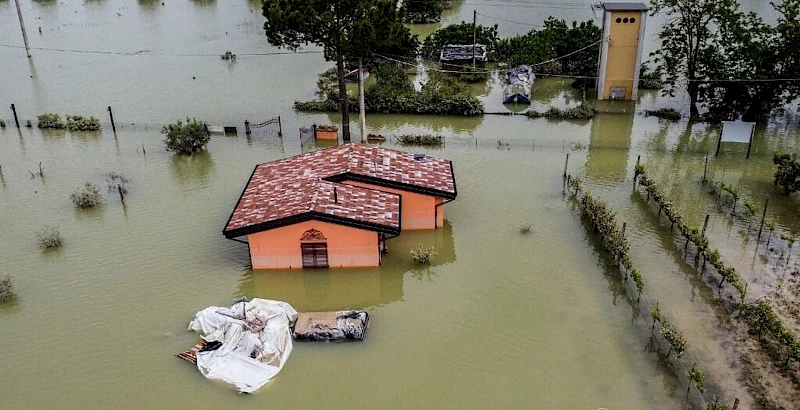Safety measures in case of flooding
As the rainy season approaches on the island, the Cypriot meteorological service has issued recommendations in case you find yourself at the center of flooding.

Indoors
- To stay informed about the current situation, it is recommended to turn on the radio or television. If there is no electricity in your area, use a battery-powered radio. Continuously monitor news updates and warnings from the Meteorological Service regarding possible thunderstorms, floods, and actions being taken.
- If your residence is on the ground floor or in a basement, it is safe to stay there only if you are absolutely sure that water cannot penetrate inside. To prevent flooding, ask neighbors for help, prepare sandbags or soil, and use a pump. Also, remember to close windows and seal any other openings and gaps.
- If you find yourself trapped in a house due to flooding, it is important to move to the highest point as quickly as possible, such as the roof. Take with you dry clothing, a waterproof brightly colored jacket, and an emergency kit including a flashlight, mirror, signal flares, etc. Stay on the roof and periodically send signals to be found and assisted quickly.
Outdoors
- If your home is far away and the threat of flooding becomes more imminent, your top priority should be to move to a safe place immediately. If you are isolated, use available signaling equipment to attract rescuers' attention.
- Try to avoid leaving residential areas to make it easier for you to be found and rescued.
- If caught in a strong current, do not attempt to move, as it may lead to injuries and the water flow may carry you away.
- If you decide that your home is not safe, before leaving the premises, try to do the following:
- Take necessary emergency equipment such as a flashlight, mirror, signal flares, etc.;
- Move as many belongings and appliances to the highest points in your home, such as cabinets;
- Stock up on dry goods for evacuation, including water, canned food, dried fruits, etc.;
- Turn off electricity, water supply, and gas. Seal all openings through which water can enter the house, close doors and windows.
In a Car
- Park on the side of the road and avoid risking further movement, as you may be trapped in a water flow, and underwater hazards may not be visible, leading to the car wheels slipping into a ditch.
- Turn on the hazard lights and stay inside the car, especially if the storm is accompanied by lightning.
- Avoid parking under trees, wires, or electric poles to prevent the danger of collapse or electric shock.
- If there is a storm, close the windows and try to avoid contact with metal parts inside the car to reduce the risk of being struck by lightning.
- Avoid driving on bridges, as they may be damaged by the water flow. Also, try to avoid areas where landslides have occurred.
- Tune in to police or fire department updates to learn about road conditions and possible detours.
Assisting Close Ones and Others
- If you find people in distress, try to help them, but first assess whether you are putting yourself in danger. It is important to inform rescuers about the situation as much as possible. Do not leave the victims unattended without attention and help.
- Cooperate with rescuers if requested and follow their instructions to ensure more effective rescue and assistance. Do not attempt to help without being asked to avoid hindrance.
Precautionary Measures
- Periodically check the house for leaks.
- Maintain regular maintenance of rainwater drainage to ensure it is always in working condition.
- If you have pumps in basement or semi-basement areas, regularly check their functionality and make sure they can pump large volumes of water.
- Securely fasten awnings, external gas cylinders, fuel tanks, solar panels, ladders, scaffolding, and other bulky and movable items to prevent them from becoming a source of danger in case of flooding.
- Before adverse weather conditions, remove temporary structures or construction materials from the roof to prevent their potential falling or displacement due to wind or water.
Frequently Asked Questions about Weather in Cyprus
Can Cyprus experience heavy rainfall?
Despite the dry climate during the summer, Cyprus can experience quite heavy rains in autumn and winter. Considering the island's mountainous terrain, riverbeds quickly fill up, and downstream they carry a significant flow of water even with light rain.
Which areas should be avoided in the rain?
Being in a downpour at the foot of the mountains or in the mountains is particularly dangerous – there can be landslides, collapses, or a very sharp rise in water levels, especially in narrow areas. For example, in the Avakas Gorge, it's better to avoid trips there in bad weather.
What is the usual weather in Cyprus in October?
Aside from showers and thunderstorms that may or may not occur in October, the weather in October is quite pleasant and still warm. We have a separate overview about the climate in this month.
In the Cyprus news on the Telegram channel, we daily publish the weather forecast, so we recommend subscribing and staying informed.

